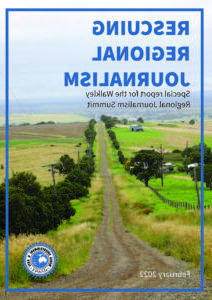Our Communities, Our Stories
 Over the past 18 months, the two biggest owners of regional media outlets (News Corp and Australian Community Media) have ceased printing and/or closed more than 20 regional and community newspapers.
Over the past 18 months, the two biggest owners of regional media outlets (News Corp and Australian Community Media) have ceased printing and/or closed more than 20 regional and community newspapers.
This is on top of more than 200 regional and community newspapers ceasing printing or closing completely over the past decade or so.
The most recent communities to be impacted are in country News South Wales, where Australian Community Media will cease printing and shift to a primarily online presence. This will be accompanied by the loss of jobs for photographers and journalists.
Many of those papers were more than a century old and were the heartbeat of their community, providing local news that big national and metropolitan-based outlets can’t or won’t provide.
Things can’t continue like this. The stories of regional and rural Australia are too important to lose.
At its face-to-face meeting on August 30, 2024, the 新萄京娱乐 National Media Section Committee passed the following resolution:
The National Media Section stands in solidarity with ACM staff from eight regional newspapers that will cease printing and three mastheads that have moved to a single weekly print edition.
We acknowledge the contributions of journalists and photographers from The Moree Champion, Tenterfield Star, The Inverell Times, Glenn Innes Examiner, Country Leader, Dungog Chronicle, Gloucester Advocate, Milton-Ulladulla Times, The Central Western Daily, The Daily Liberal and Western Advocate.
The National Media Section notes the importance of regional newspapers in ensuring communities are informed and holding powerful figures and organisations to account amid challenging economic conditions.
The NMS notes the direct impact of Meta’s withdrawal of funding under the media bargaining code has had on ACM’s decision to scale back print editions of its regional publications and the importance of funding from technology giants such as Google for the sustainable future of journalism.
The crisis in regional media is in part due to relaxation of media ownership laws that have allowed big corporations to buy up local mastheads, exploit journalists, sell assets, cut jobs and close papers. It is the local communities who lose out.
It’s also clear that previous federal government efforts to support regional journalism have been insufficient and poorly targeted and have failed to do little more than offset newsprint costs for big media corporations while closures have continued unabated.
Regional media needs more government financial support, but funding must be directed to employing journalists to provide genuinely local news to serve their communities.
And there must be guarantees that staff and freelance journalists in regional Australia will receive fair minimum rates of pay and conditions.
The decline of regional and rural journalism leaves obvious gaps in the important role that journalism plays in a democracy of keeping the public informed and holding powerful institutions accountable.
Our elected representatives at the state and federal levels need to stand up for the communities they serve by adopting policies to support regional and rural journalism.
Take action by using the tool on this page to email your MP.
Want to know what else you can do to help support regional newspapers?
After signing the petition, here are a few things:
1. Share this in any local Facebook groups you’re part of, for example, community or sports groups, and help build support for regional newspapers in your communities.
2. One more way you can help is to subscribe to your regional newspaper. Just head to your newspaper’s homepage website and click the subscribe button (normally near the top-right corner of the page).
新萄京娱乐 submission to House of Representatives inquiry into regional newspapers
Watch a discussion about why regional newspapers matter:

